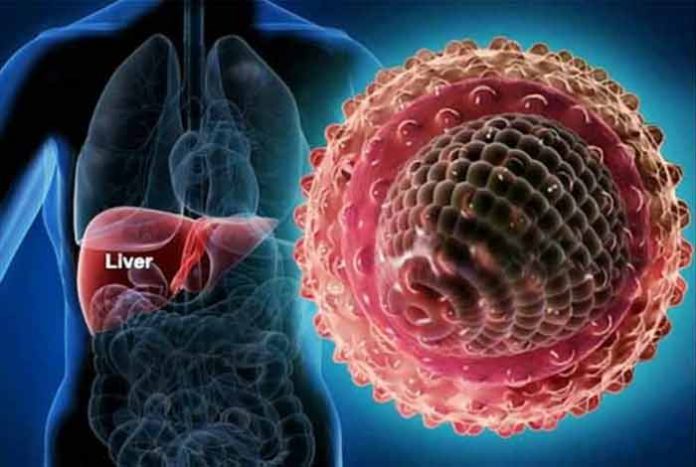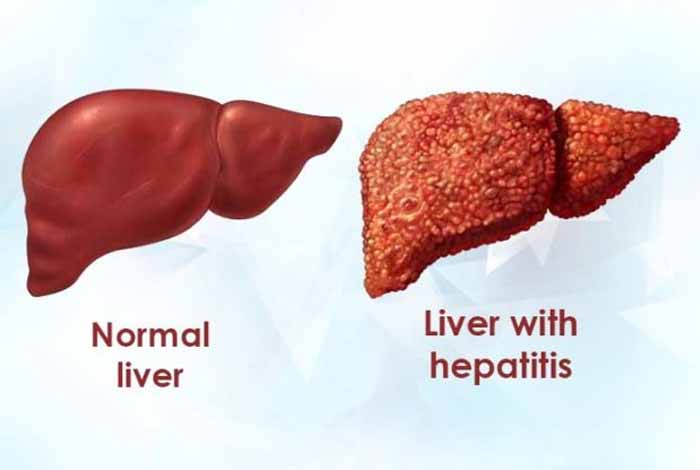
Overview and Statistical Facts:
Liver is one of the most important organs of the body. It helps the body to digest food, remove toxins and store energy. Hepatitis is a condition in which the liver becomes inflamed. There are different causes for developing hepatitis, such as viral infection, heavy use of alcohol, medicines, toxins, infections, autoimmune diseases, and non-alcoholic steatohepatitis (NASH). There are five types of viral hepatitis, namely A, B, C, D and E. Out of these, Hepatitis A, B, C are the most common types. Hepatitis affects the liver’s ability to function properly.
According to a report published by the WHO in April 2017, there are approximately 325 million people who are affected with hepatitis C or B worldwide. The WHO Global hepatitis report, 2017 indicates that majority of these patients do not have access to life saving testing and treatment. Patients with long-term untreated hepatitis are at a high risk of developing chronic liver disease, cancer and ultimately death.
In 2015, viral hepatitis caused approximately 1.34 million deaths. It has been observed that the number of deaths from hepatitis is on the rise.
Viral hepatitis is now recognized as a major public health challenge that requires an urgent response, according to Dr. Margaret Chan, Director-General at WHO. He mentions that vaccines and medicines to tackle hepatitis are available, and WHO is committed to ensuring that these tools reach all those who need them.

Types and Symptoms of Viral Hepatitis
Types of Hepatitis:
There are five different types of viral hepatitis, namely Hepatitis A, B, C, D and E. These are all caused by different viruses, namely:
- Hepatitis A by Hepatitis A Virus (HAV)
- Hepatitis B by Hepatitis B Virus (HBV)
- Hepatitis C by Hepatitis C Virus (HCV)
- Hepatitis D by Hepatitis D Virus (HDV)
- Hepatitis E by Hepatitis E Virus (HEV)
a) Hepatitis A: It generally spreads through contaminated food or water. However, it can also spread through certain sex practices. These infections are not severe, and patients make complete recovery. They also develop lifelong immunity against the disease. However, in some cases, the disease can become severe and life threatening.
Symptoms of hepatitis A are:
- Fatigue
- Sudden nausea and vomiting
- Abdominal pain especially in the upper right side
- Clay colored bowel movement
- Loss of appetite
- Low grade fever
- Dark urine
- Joint pain
- Yellowing of skin and whites of the eyes
- Intense itching
b) Hepatitis B: It spreads when a healthy person comes in contact with infectious body fluids, such as blood, vaginal secretions or semen, which contain HBV. Most patients with hepatitis B infection make recovery in a few months and they develop a lifelong immunity against the virus. However, there are a few people who do not recover from the disease even after 6 months and are known as carriers. These people can infect other people through unprotected sex, shared needles or contact with blood or open sores. In these patients, the disease might get cured on its own or it can develop into chronic hepatitis.
Symptoms of hepatitis B are:
- Jaundice
- Light colored stool
- Fever
- Fatigue
- Loss of appetite
- Nausea and vomiting
- Pain in abdomen
Symptoms do not appear 1 to 6 months after the infection. It can only be diagnosed after a blood test.
c) Hepatitis C: It spreads through direct contact with body fluids, especially through use of infected injection and sexual contact. It is the most serious form of viral hepatitis. It can be acute hepatitis, which lasts for about six months or chronic, which can be lifelong. Acute hepatitis C often develops into chronic infection.
Symptoms of hepatitis C are:
- Fever
- Fatigue
- Loss of appetite
- Nausea and vomiting
- Pain in abdomen
- Joint or muscle pain
- Yellow discoloration of eyes and skin
- Easy bleeding
- Itchy skin
- Weight loss
- Confusion, drowsiness and slurred speech (hepatic encephalopathy),
spider-like blood vessels on skin (spider angiomas)
d) Hepatitis D: It occurs concurrently or as super-infection with hepatitis B, since hepatitis B virus is vital for the replication of hepatitis D virus. The infection spreads through contact with blood or other body fluids of the infected person. Currently, there are no antiviral therapies available for treating hepatitis D.
Symptoms of hepatitis D are:
- Loss of appetite
- Nausea and vomiting
- Fatigue
- Pain in abdomen
- Muscle and joint pain
- Jaundice
- Dark urine
- Pale feces
- Rash
Acute hepatitis D infection occurs when the person gets infected with both HBV and HDV simultaneously. Most of the people recover from the infection on their own. But in some cases, the disease can develop into chronic form.
Hepatitis E: It spreads through contaminated food and water and therefore, the disease is more prevalent in areas with poor sanitation. It is more common in developing countries due to poor hygiene practices in these areas. There are vaccines available to prevent hepatitis E infection, but are not widely used.
Symptoms of hepatitis E are:
- Abdominal pain
- Loss of appetite
- Weight loss
- Nausea
- Fever and chills
- Mild headache
- Tiredness
- Dark urine and pale feces
- Jaundice

Risk Factors of Viral Hepatitis
Following are the factors that increase a person’s chances of developing viral hepatitis:
- Contaminated food and water
- Consumption of raw shellfish
- Infants born to mothers with hepatitis B and C
- Men who have sex with men
- People who have anal sex
- People who have multiple sex partners
- People who use illicit drugs and share needles
- Use of cocaine
- Body piercing and tattooing
- People exposed to infected body fluids. These people include healthcare workers, dentists, firefighters, funeral directors, people caring for children, who have not received toilet training, police personnel, etc.
- People traveling to country where hepatitis A and E are prevalent
- Multiple blood transfusion
- Organ transplantation
- Kidney disease that requires hemodialysis
- Hemophilia
- People having HIV
- People who are on immunosuppressive drugs
- People with elevated levels of alanine aminotransferase (ALT) in their blood
- People born between 1945 and 1965

Do I have Viral Hepatitis?
If you observe any changes in your skin color or color of eye’s white portion, along with loss in appetite, weight loss, pain in the upper right abdomen and bloating, you might have some trouble with your liver. If you feel tired all the time and observe changes in your urine and stool colors, you should visit a health care provider and get yourself checked. If you have multiple sex partners or indulge in anal sex or use share needles for injecting drugs, you must get yourself checked for hepatitis B and C regularly, as in about 80% of the cases, they do not show any symptoms. If you have visited any country where proper sanitation methods were not followed, it is advised to screen yourself for hepatitis.
However, certain other diseases like anemia might also show symptoms, such as fatigue, weight loss, loss of appetite, etc. Fever, headache, nausea and muscle pain is common in flu infection as well. Therefore, blood tests are necessary for correctly diagnosing hepatitis.

Causes and Prevention of Viral Hepatitis
a) Hepatitis A:
Hepatitis A is a highly contagious infection of liver which is caused by hepatitis A virus. The virus spreads through contaminated food and water or through close contact with the infected person. Mild cases of hepatitis A do not require any treatment and is cured on its own. Most of the patients suffering from hepatitis A recover completely without any permanent damage to liver.
To prevent getting infected by hepatitis A virus, following practices can be followed:
- Good hygiene practices
- People traveling to countries which have low socioeconomic status should get themselves vaccinated before their trip.
- Raw shellfish, uncooked food and foods that are cooked using contaminated water should be avoided.
- Drinking water should be boiled up to 85 degrees Celsius at least for one minute before consuming. Iodine crystals or chlorine can also be used for purifying drinking water.
b) Hepatitis B:
Vaccination against hepatitis B virus provides protection for about 15 years and possibly longer. The Centers for Disease Control and Prevention (CDC) emphasizes upon vaccination of all newborns, individuals up to the age of 18 years, and adults who are at risk of developing the infection. There are three injections that are given over a period of 6 to 12 months.
General precautionary measures that can be taken to prevent hepatitis B infection are:
Maintaining proper hygienic conditions
- Using condoms
- Avoiding tap water when traveling to countries with low socio-economic status
- Avoiding sharing of drug needles
- Avoiding sharing of personal items, such as toothbrushes, nail clippers, razors, etc. with an infected person
c) Hepatitis C:
Many people infected with hepatitis C are unaware of their infected status. It is therefore recommended that if a person is at a high risk of getting infected, they should be screened for hepatitis C infection, as recommended by the CDC.
Following precautions can be taken to prevent getting infected by hepatitis C virus:
- Avoiding sharing of needles
- Avoiding direct exposure to blood and blood products
- Avoiding sharing of personal items
- Practicing safe sex
- Choosing tattoo and piercing parlors carefully
- Safely handling and disposing sharps and waste
- Testing donated blood for hepatitis B and C
- Hepatitis C is not known to spread by kissing, cuddling, breastfeeding, hugging, coughing, sharing utensils or sneezing.
d) Hepatitis D:
Hepatitis D occurs only to people infected with hepatitis B. Hence, preventive measures to be taken to protect against hepatitis D include:
- Vaccination against hepatitis B
- Avoiding exposure to blood and blood products
- Avoiding sharing of needles
- Practicing safe sex
It should be noted that vaccination against hepatitis B virus does not provide immunity against hepatitis D virus if the person is already having hepatitis B.
e) Hepatitis E:
To prevent getting infected with hepatitis E virus, following precautions can be taken:
- Avoiding drinking tap water or water that has not been purified
- Maintaining proper disposal of human excreta
- Maintaining hygienic conditions while handling food and water
- Avoiding uncooked foods

Diagnosis and Tests of Viral Hepatitis
a) Hepatitis A:
Hepatitis A is diagnosed by performing blood tests in which antibodies formed against hepatitis A virus are detected. Additionally, RT-PCR tests are done to identify the nucleic material of RNA virus.
b) Hepatitis B:
There is no way to correctly diagnose hepatitis B infection without blood test. Following tests are undertaken to diagnose hepatitis B:
- Blood tests: These are done to detect presence of hepatitis B virus in the body. It also helps in determining whether the infection is chronic or acute.
- Liver ultrasound: The amount of liver damage caused due to hepatitis B is determined by a special ultrasound technique called transient elastography.
- Liver biopsy: In this process, a small sample of liver tissue is taken out and analyzed for determining liver damage.
c) Hepatitis C:
Patients with hepatitis C are generally asymptomatic and hence they are not detected in their acute phases. Even in patients with chronic disease, the symptoms do not exist, and they only appear when the disease has progressed to a stage in which the liver damage is secondary to serious liver damage.
Diagnosis of hepatitis C occurs in two steps:
- The antibodies for hepatitis C virus are identified through blood tests.
- If the blood test is positive for the presence of antibodies against hepatitis C virus, a second test is done in which the nucleic material of hepatitis C virus is detected. This test is used as a confirmatory test for diagnosing hepatitis C virus.
Patients who are diagnosed for having chronic hepatitis C undergo further tests to determine the level of liver damage. Also, tests are done to identify which strain of virus has infected the person. There are six strains of the virus and it is possible to be infected by more than one strain.
d) Hepatitis D:
Diagnosis of hepatitis D involves testing the blood for the presence of antibodies against hepatitis D virus. It is confirmed by detecting genetic material of hepatitis D virus in the blood of an infected person. However, diagnostic tests for hepatitis D are not available readily.
e) Hepatitis E:
Diagnosis of hepatitis E involves testing the blood for the presence of antibodies against hepatitis E virus, and if it comes positive, then it is tested for the presence of nucleic material of HVE.
A novel test in which the antigen of the virus is tested in serum of the suspected person has been developed. However, it is not yet accepted as a standard test.

Treatment and Care of Viral Hepatitis
a) Hepatitis A:
No specific treatment for curing hepatitis A is available. Recovering from the diseases requires time which might vary from several weeks to several months. Medicines should only be taken under medical supervision. Acetaminophen or paracetamol should not be given to patients. Hospitalization might become necessary in case of liver failure. The patient should be given enough fluids and adequate nutrition to help him avoid dehydration and malnutrition due to recurring vomiting and diarrhea.
b) Hepatitis B:
Treatment to Prevent Hepatitis B Infection Immediately after Exposure:
If a person determines that he has been exposed to hepatitis B virus and is unsure of his vaccination status, then he must visit a health care provider within 12 hours and get an injection containing antibodies to prevent himself from getting infected.
He must also get hepatitis B vaccine to prevent the infection.
Treatment of Acute Hepatitis B Infection:
For acute hepatitis B infection, no treatment is available. It is managed by taking proper rest, nutrition and fluids. If the condition becomes severe, anti-viral drugs can be prescribed, or the patient might be hospitalized.
Some medicines, such as metoclopramide and chlorphenamine are prescribed for managing symptoms, such as feeling sick, itching etc.
Regular blood tests are performed to check the disease progression.
Treatment of chronic hepatitis B infection:
If a person develops chronic hepatitis B infection, then he is required to undergo treatment for the rest of his life. Following treatment measures are undertaken to decrease liver damage and prevent further transmission of disease:
- Anti-viral drugs: Anti-viral drugs, such as entecavir, tenofovir, adefovir, etc. are prescribed for treating chronic cases of hepatitis B infection. These help the body to fight infection and decrease liver damage. They are taken orally.
- Interferon injections: Interferons are proteins that are produced by the body to fight infections. These interferons (Interferon alfa-2b, Intron a) are made in the laboratory and injected into the patient to assist his body in fighting the infection. It is generally prescribed for younger people who do not want long-term treatment or for women who have plans of getting pregnant in a few years, after completing the complete course of medication. However, interferons should not be prescribed to pregnant women.
- Liver Transplantation: Liver transplantation might be done if the liver becomes severely damaged. In this, the damaged liver is replaced by a healthy one.
c) Hepatitis C:
It is not always necessary to get a treatment for hepatitis C infection because in many cases, the virus cannot affect a person due to a strong immune response. Some people with chronic infection do not develop liver damage. If the treatment becomes necessary, its aim is to cure the disease which depends on the strain of virus infecting the patient.
- Antivirals: Antivirals, such as sofosbuvir, daclatasvir and sofosbuvir/ledipasvir are prescribed as per the WHO guidelines. They are known to have 95% cure rate. Recently, DAAs or directly acting antivirals are being developed which provide faster treatment with lesser side effects.
- Liver Transplantation: If the patient develops serious complications due to hepatitis C virus infection, the patient might have to undergo liver transplantation. However, hepatitis C is not cured after liver transplant. The patient is required to undergo treatment with DAAs, which have shown some positive result in treating post-transplant hepatitis C.
- Vaccination: Although there are no vaccines available for hepatitis C, it might be recommended to receive vaccinations against hepatitis A and B, as they are known to complicate the course of hepatitis C infection and cause liver damage.
d) Hepatitis D:
There is no treatment for hepatitis D infection, chronic or acute. However, following steps can be taken to minimize the symptoms:
- Interferon Therapy: PEGylated interferon alpha-2a are synthesized in the labs and is prescribed to the patient to help his body fight infection. It is the only drug that is effective against hepatitis D infection.
- Antivirals: Antivirals have limited or no effect in hepatitis D infection.
- Liver Transplantation: Liver transplantation is suggested in patients with advanced stages of liver damage.
e) Hepatitis E:
There is no treatment for hepatitis E infection if a person is suffering from it for more than six months i.e. acute hepatitis E. The body cures itself in four weeks after the symptoms appear. In some cases, the patients might be treated with anti-virals like ribavirin.
If a person gets infected with hepatitis virus, he should take the following steps to manage his diseased condition:
- Eating healthy diet, which is low in cholesterol and fat. Raw and undercooked foods should be avoided along with oysters and other shellfish.
- Staying hydrated is important to prevent dehydration occurring due to frequent vomiting and diarrhea. 8-10 glasses of water are recommended by experts.
- Alcohol consumption should be avoided under all circumstances. Taking alcohol even in small amounts can be detrimental for the body.
- Proper sanitation practices should be followed.
- Patient should follow safe sex practices and inform his/her partner about his diseased condition.
- People attending to the patient should take extra care of themselves and try not to get infected. They should avoid sharing personal items with the infected person.
- People who are on drugs should try and abstain themselves from drug abuse. Also, they should not use needles used by others, for injecting drugs.
- Patients with hepatitis should get liver function test done periodically so that progressive damage to liver can be monitored.
- Hepatitis B patients should also get themselves tested for the presence of hepatitis D virus, as both the diseases are known to occur simultaneously in chronic cases as super infection.

OTC Medication and Self-Management Methods for Viral Hepatitis
OTC medications are not suggested in patients having hepatitis as they can result in damaging the liver. Any medication that is taken for managing the symptoms should be taken only under medical supervision.
For self-managing the disease, following steps should be taken:
- Taking proper rest in cases of acute hepatitis
- Consuming diet low in cholesterol and fat
- Keeping the body hydrated
- Maintaining proper sanitation
- Practicing safe sex
- Avoiding self-medication
- Avoiding alcohol consumption
- Avoiding sharing of personalized items with others
- Informing the other partner before sexual activity
- Abstaining from preparing food for other people
- Avoiding injected drug use
- Avoiding blood, tissue or organ donation

Natural Ways to Cure Viral Hepatitis
Symptoms of hepatitis can be managed naturally by using the following remedies:
- Reishi Mushrooms: These mushrooms have shown promising results in managing hepatitis with serious liver failure. It is known to balance immune system and improves liver function. It is used in herbal Chinese medicines.
- Milk Thistle: It is a well-known liver tonic. They strengthen the outer membranes of liver cells and therefore improves the overall health of liver tissues. It also prevents toxins from entering into liver cells. It increases synthesis of protein in liver cells and helps in promoting regeneration of liver tissues. It also contains antioxidants and helps in protecting the liver cells against damage caused due to repeated use of prescribed drugs. It is also known to protect liver against the harmful effects of alcohol consumption, pollutants, etc.
- Black Seed Oil: It is known to improve function of liver. It strengthens the immune system.
- Zinc: Zinc helps the liver to function properly and aids the immune system in fighting infections.
- Probiotics: They increase the concentration of healthy bacteria in the body which help in promoting health of liver and aids in its functioning. It also improves body’s defense system, which helps the body in fighting infections. According to a report published in Hepatitis Monthly, probiotics help in reducing the symptoms and improve liver health. This therapy is inexpensive, safe and noninvasive.
- Vitamin D: People with liver disease often develop deficiency of vitamin D because it is stored in liver. Vitamin D supplements can help in improving liver function and immune system.
- Peppermint oil: It can be used for managing nausea and vomiting, which are debilitating symptoms of hepatitis.
- Ginger: Ginger is known to stimulate immune system, cleanse lymphatic system and help the body to detoxify. It also helps in relieving symptoms of nausea.

Health Tip by Expert
Hepatitis is a serious condition of liver, which can be avoided by practicing general hygienic practice and getting proper vaccination. Safe sex practices, non-sharing of needles for drug use help in managing the disease. Acute cases of hepatitis get managed by themselves. However, if it develops into chronic form, it can be severe. Proper care under the supervision of a medical practitioner is recommended. It is possible to lead a normal life with hepatitis.




